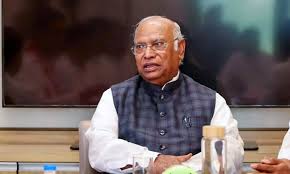Congress chief Kharge asks Centre to provide funds for northeastern states grappling with floods

Northeastern India faces yet another severe flood crisis. Heavy rains and landslides have devastated several states. Thousands of families remain displaced and in urgent need of help. In response, Congress President Mallikarjun Kharge has urged the central government to release immediate financial aid for the affected regions.
The Flood Situation in Northeast India
Assam, Arunachal Pradesh, Manipur, Meghalaya, and Sikkim have suffered extensive flood damage this monsoon season. Floodwaters have submerged homes, farms, and infrastructure. Over 400,000 people in Assam alone have lost their homes or had to relocate temporarily. Ten lives have been lost so far. Critical roads and bridges are damaged, leaving some villages isolated and making rescue work difficult.
This yearly calamity highlights how vulnerable the northeast remains to monsoon flooding. Despite weather warnings and past disasters, the region remains poorly prepared for such events.
Kharge’s Call for Urgent Funds
Kharge has publicly called on Prime Minister Narendra Modi and the Centre to immediately release funds to tackle this crisis. He urged the government to unlock the PM CARES Fund, which remains unaudited but reportedly holds large amounts of money. Kharge argues these funds should support flood relief efforts now.
He criticized the BJP government for failing to fulfill promises made in 2016 and 2022 to make Assam flood-free. Despite announcements of flood control projects, the impact remains minimal. Kharge said this neglect leaves many northeast residents abandoned during disasters.
“The government must act swiftly and responsibly,” Kharge said. “People need help now, and funds must flow without delay.”
Controversy Over PM CARES Fund
Kharge’s demand puts the spotlight on the PM CARES Fund, set up in 2020 for emergencies. Critics say the fund lacks transparency. Despite gathering millions through donations, it remains unaudited. Kharge accused the government of holding back these funds instead of deploying them where needed most.
He called for immediate release of the money to provide food, shelter, medicine, and other essentials for flood victims.
The Human and Economic Toll
The floods have destroyed crops at critical harvest time. This loss threatens farmers’ incomes and local food supply. Roads and bridges essential for trade and daily life lie damaged. Communication breakdowns delay relief efforts and worsen hardship.
Thousands have taken refuge in makeshift camps on higher ground, while schools and community centers serve as temporary shelters. Access to clean drinking water and healthcare is limited, raising fears of disease outbreaks.
Kharge stressed that the Centre and state governments must coordinate closely. He also urged NGOs and local communities to help distribute aid effectively to those most in need.
Support from Congress Leaders
Rahul Gandhi, former Congress president, expressed deep sorrow over the flood casualties. He called on all levels of government to accelerate rescue and relief operations. Gandhi also urged Congress workers to mobilize and provide on-ground assistance.
The party demands an independent investigation into failed flood management policies and accountability for officials responsible. Congress leaders remain vocal about the need for better disaster preparedness.
Challenges and Long-Term Solutions
Flooding occurs annually in the northeast because of heavy rains, steep terrain, and rivers like the Brahmaputra that swell quickly. Emergency relief saves lives, but experts say long-term planning is critical.
Solutions include strengthening embankments, restoring wetlands, improving drainage, reforesting catchment areas, and adopting community flood management practices. Better weather forecasting and early warning systems can provide valuable time for evacuation.
Kharge’s appeal highlights the urgent need for these preventive measures. Without them, floods will continue to cause widespread damage year after year.
Government Response and Public Demand
The Centre claims it has deployed rescue teams and allocated emergency funds. The National Disaster Response Force (NDRF) assists local efforts. However, many residents and opposition voices say the response remains inadequate given the disaster’s scale.
People demand faster, transparent fund allocation and stronger policy commitments to protect flood-prone areas like the northeast.
Conclusion
The northeast faces a recurring flood crisis that threatens lives and livelihoods. Congress President Mallikarjun Kharge’s demand for immediate funding calls attention to gaps in flood management and disaster response.
To protect vulnerable communities, the government must act promptly and transparently. More importantly, it must invest in sustainable solutions that reduce flood risks in the long run.
As floodwaters recede, families start rebuilding. Yet the cycle of destruction will continue unless authorities prioritize flood preparedness and resource allocation with urgency.






